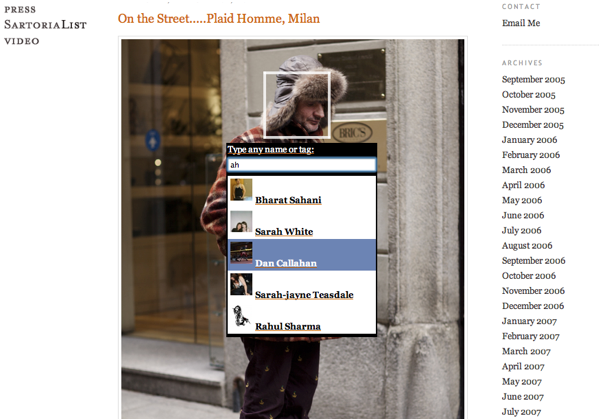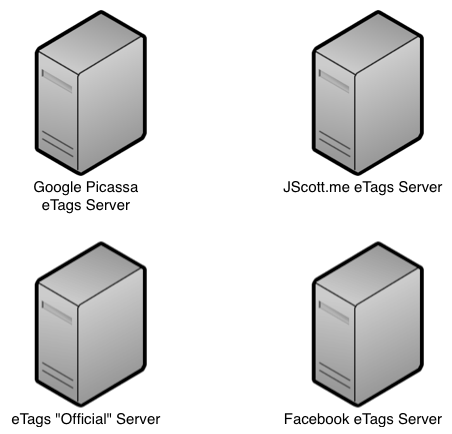Two-Part Project
This project consists of two parts which could be developed independently, but when grouped together, serve a much more useful purpose. These two parts are a cross-site (commercial) image tagging solution, and a distributed open-source tagging protocol (and a server implementing it) which could be used to share tagging data across different social networks.
Motivation
Right now, Image (and other social data) data is stored in isolated data silos and if a user on Facebook wanted to share their photographs with users of Flickr, they would either have to sign up to Flickr or have their friend sign up to Facebook. This discourages the creation of new social networks by forcing everyone to stay on the most popular one, and this in turn discourages innovation as new features are entirely in the hands of a few large companies (Facebook, Twitter, etc.).
This also means the users are required to accept the terms set out by whoever happens to be the largest provider, or suffer isolation from their peers. This often results in users accepting whatever terms they need to, which may be unfair.
For example the facebook terms and conditions state that by uploading an image you are giving a transferable, sub-licensable, royalty-free, worldwide license to use that image. This is less draconian than the previous terms in which the user could not revoke the license by deleting it:
We wish to propose a system whereby the user has a choice of accepting the terms and conditions or moving to another network, without the negative aspects of that change which currently exist (losing contact with friends, inability to access photos already uploaded, etc.).
Small Scale?
This project may seem small scale when compared to more ambitious projects such as Diaspora or Movim which attempt to implement a distributed version of an entire social network. We feel that these projects, while admirable, are overly ambitious and will not succeed at tackling Facebook directly due to network effect and user apathy. By targeting on a smaller area where a dedicated service could offer more functionality than Facebook (tagging images on different sites across the internet) we can potentially get people to use the service without having to move from Facebook. As other services integrate more fully with the decentralised tag store they would have an advantage over Facebook (where you could see images from all over the web on these other services and you can only see Facebook images on Facebook) and this provides an easier migration path from Facebook to a more open solution in the long term.
A cross-site tagging solution
The first part of our proposal is a tagging solution that can be installed by website owners to allow visitors to the site to tag images in the same way people tag images on Facebook currently.
There exists on the web many photographs which are not inside facebook which could use this functionality. This includes fashion websites, photography websites, and personal websites where people may post photos of themselves and their friends. Currently if they want these photos to also be linked to social networking accounts they must also upload these photographs to the social networks and tag them. This introduces redundancy and if they wish to delete or modify a photograph they will have to do it in several places instead of just one.
We propose a system that would allow users to authenticate with a social network account (on any participating social network), and tag photographs of their friends (from that social network) which will then be seen on the social network.
The tags would appear on user’s walls in the same way (or as close as possible to the same way) that photograph’s posted within the network are.
There will be applications built using the major social networks’ apis which allow people to view tags from all over the web of a user, and also a web browser plugins which make these photos available as a normal album as if the service is integrated with the social network (for those users with the plugin installed).
The functionality can be enabled on a site-by-site basis by a site owner including the tag javascript in the source code.
This would mean all visitors to the website could tag (assuming they have a social networking account).
Users could also install the plugin which would then enable the functionality on every website.
A decentralised tag store
This services raises the question “Why should we trust you with our data over Facebook?”. The answer is that this service is backed by an open, decentralised tag store which allows you to retain ownership of your images and take your tags with you when you move.
Long term, other social networks/websites could host their own servers which participate in a peer to peer fashion with the existing servers. This would allow, for example, Google to host the tags for picassa while still allowing users of other social networks to see the tags (and allowing picassa users to see their images tagged elsewhere).
Other efforts such as OExchange show that large companies such as Google, Microsoft, and Digg are interested in working together to weaken Facebook’s monopoly. So if something like etags was specified properly it is possible that they could be convinced to embrace it.
The servers will allow authentication through any participating social network, which allows for future social networks to access all of the existing tag data and reduces to difficulty in convincing existing users to switch.
We feel like the combination of these two services provides real value for users of social networks, owners of social networks, and users of the web in general.







